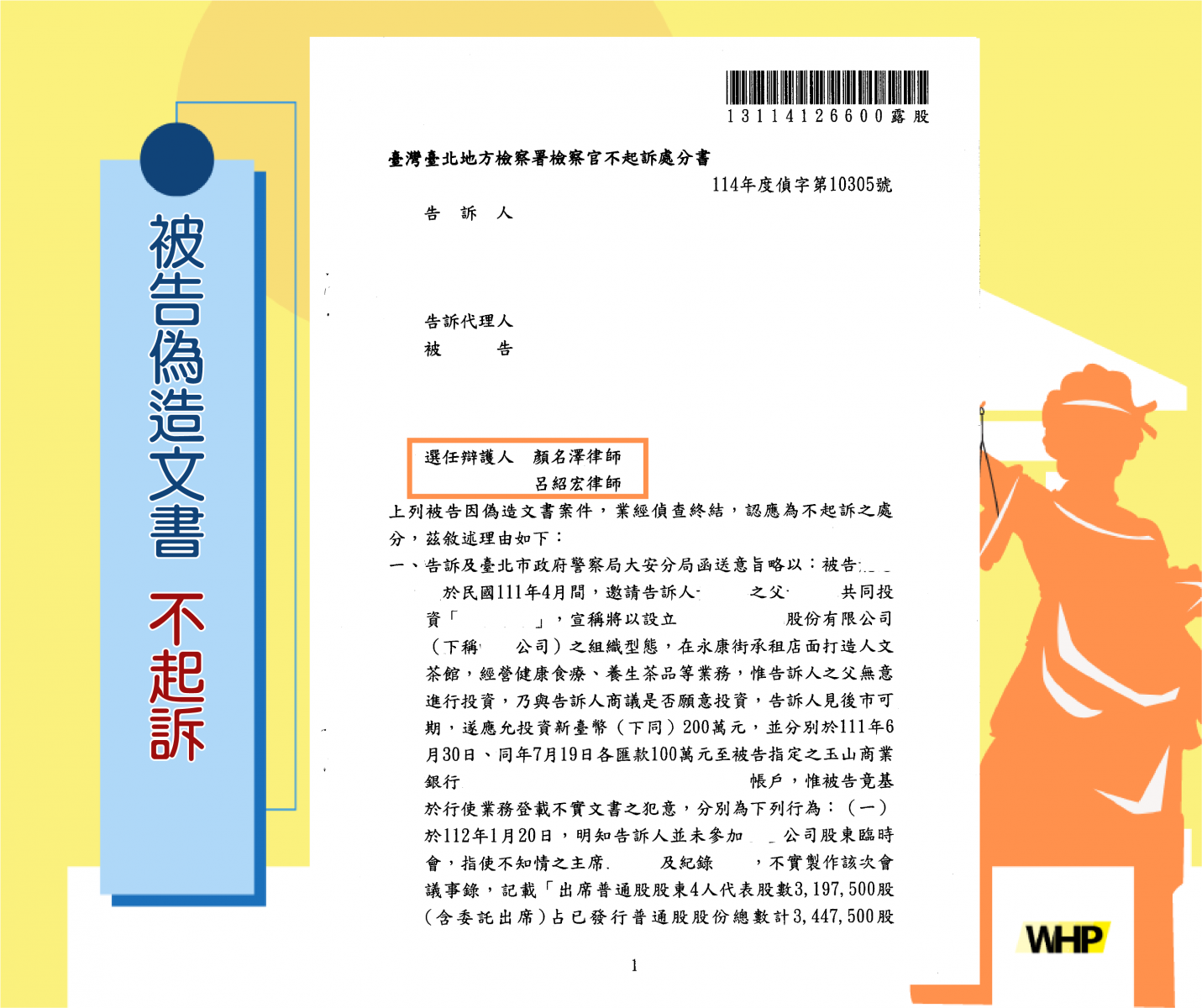首頁 >
| Internal Company Dispute Defendant Forged Documents Non-Prosecution

Relevant Legal Provisions
Criminal Code Article 215:A person engaged in business, knowing that a matter is false, records it in a document prepared in the course of their business, and such is sufficient to cause damage to the public or others, shall be sentenced to imprisonment for not more than three years, short-term detention, or a fine of not more than fifteen thousand dollars.
Criminal Code Article 216:A person who uses a document under Articles 210 to 215 shall be punished in accordance with the provisions regarding forged, altered, or falsely recorded documents, or documents containing false entries.
Facts and Reasons
The complainant alleged that the defendant (our client), knowing that the complainant had not participated in the extraordinary shareholders' meeting, falsely prepared meeting minutes and recorded inaccurate shareholding information, then applied for an amendment of registration with the Taipei City Government, thereby causing damage to the complainant. However, in reality, the defendant was not responsible for recording the minutes of this meeting and had no knowledge of the transfer of shares or the change of registration.
Prosecutor's Disposition
The above defendant, involved in the forgery of documents case, has been investigated and determined to be non-prosecuted.
According to witness testimony, although the complainant did not attend the extraordinary shareholders' meeting, it cannot be excluded that the complainant's father completed a power of attorney and handed it to the defendant, who then included and recorded the complainant's shares in the meeting minutes. It is therefore difficult to directly conclude that the defendant committed the offense of making false entries in business documents.
Another witness also stated that the shareholders' register and related documents were typed by the witness, showing that the actual handler of the company's share transfers was not the defendant. Whether the defendant truly knew of the complainant's shareholding changes, and thereby committed the offense of making false entries in business documents, remains uncertain.
In summary, based on the principles of the presumption of innocence and in dubio pro reo (doubt favors the accused), and in the absence of other positive evidence, it is not possible to rely solely on the unilateral accusation of the complainant to make an adverse finding against the defendant.
(Some details of the case have been adjusted or omitted to protect the parties' rights.)
Attorneys: Herman Lyu、Ian Yan
-
11.25 2025
Criminal | Forgery of Documents, etc. Successfully...
-
11.18 2025
Civil Case | Defendant’s Claim for Damages Success...
-
11.11 2025
Criminal | Violation of Anti-Money Laundering Act,...
-
10.28 2025
Criminal Case | Defendant Acquitted of Hit-and-Run...
-
10.21 2025
Criminal Case | Defendant Charged with Forgery Acq...
-
10.14 2025
Assisted in the Division of Co-owned Property and ...
-
09.30 2025
Defendant – Offenses Against Sexual Autonomy Appea...
-
09.23 2025
Criminal | Defendant Charged with Embezzlement in ...
-
09.16 2025
Criminal | Case of Infringement of Sexual Privacy ...
-
09.09 2025
Request for Ownership Transfer Registration – Plai...
-
09.02 2025
Civil | Joint Construction Dispute Requesting Perf...
-
08.26 2025
Criminal | Defendant Charged with Aggravated Fraud...
-
08.19 2025
Internal Company Dispute Defendant Forged Document...
-
08.12 2025
Civil Case | Check Dishonored – Claim for Loan Rep...
-
08.05 2025
Heavy Motorcycle Rear-End Collision, Lawsuit for N...